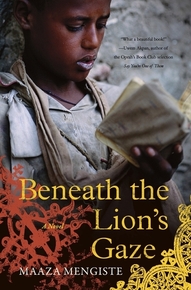Tadias Magazine
By Tseday Alehegn

Updated: Thursday, January 10, 2013
New York (TADIAS) – Last week we highlighted an upcoming documentary entitled Girl Rising, which is scheduled for release in Spring 2013. The feature-length film displays the power of access to education in the life of a girl residing in a developing nation. Each girl’s story is told by a talented writer from her native country. The script writer for the segment on Ethiopia is Maaza Mengiste, author of the critically acclaimed novel Beneath the Lion’s Gaze. In preparation for the documentary, Maaza spent time with a young girl from a village outside of Bahir Dar.
Below is our interview with Maaza Mengiste.
TADIAS: Please tell us about how you got involved with the film?
Maaza Mengiste: I was living in Rome when Richard Robbins, the director of the film, contacted me about the project. I learned more about it then spoke further with two of the producers, Martha Adams and Alex Dionne. I was skeptical at first about whether this could really happen, but soon, I was on a plane to Addis, then a smaller plane to Bahir Dar, then on a very shaky Land Rover through mountain roads to Yilmana Densa to visit Azmera and her family.
The main focus of the 10×10 campaign is to show audiences how educating one girl can impact her entire family and her community and make positive changes. Each of the 10 segments in the 10×10 film highlights a country and the biggest obstacles preventing girls from getting their education. It’s different in each country and in Ethiopia, the biggest issue is forced early marriage. This film is different from so many of those charity programs or other documentaries we see. It’s not about the tragic lives of people in poor countries. This film is about how these young girls took their own first steps in making their lives better. They aren’t asking for charity. They only want the right to fulfill their potential and go to school. The idea of working on a project that told stories of how young girls were changing their own lives, rather than waiting for adults, fascinated me.
TADIAS: Can you also tell us a bit about your script and character?
Maaza: This is a documentary film, but Richard gave me full freedom to create what I wanted based on the time I spent with Azmera and her family. I talked to her and found her to be painfully shy, like a typical abesha girl. But something else was there also, a quiet strength and a stubbornness I saw when she played with her cousins. I also witnessed the intense love her family has for her. She is adored. I was interested to put this picture next to the image of a young girl forced to marry a stranger when she wasn’t even a teenager. But I had a chance to talk to her mother and other family members and the story that emerged helped me to write my script and find a focus of how to write about their lives.
TADIAS: The 10×10 site also features a book club focused on your novel Beneath the Lion’s Gaze as well as articles and policy briefs on Ethiopia. Can you tell us more?
Maaza: Each of the writers on the project (there are 10) has a specially designed book club tool kit available on the 10×10 website. That tool kit gives you step-by-step instructions on how to host your own book club, how to invite people, how to facilitate discussions, what questions you can ask, and even has an in-depth interview with the writer. It’s a wonderful way to get involved with the 10×10 project beyond the film.
TADIAS: What do you see as the primary challenge for girls seeking access to education in rural Ethiopia?
Maaza: It was heartbreaking to see how hard young girls were trying to go to school and get their education. They are intelligent, they are eager, they are determined, but they don’t have the simple resources to attend school. They are needed to work at home and take care of family or bring in extra income. I think the primary challenge involves finding ways for families to be able to send their daughters to school and still survive financially. It wouldn’t take much, and there are good organizations helping, but more needs to be done and I hope this film raises that awareness. I hope the film shows the world that these young Ethiopian girls have had the courage to fight for their future, and now they want the ability to continue living their dream of going to school. I am so very proud of each of them, and of Azmera and her family.
TADIAS: Thank you for sharing with our audience!
Maaza: Thank you, Tadias!
—-
Watch the trailer:
—
Related:
Learn more about ‘Girl Rising’ Film + Campaign (10 x 10)
—
Join the conversation on Twitter and Facebook.

